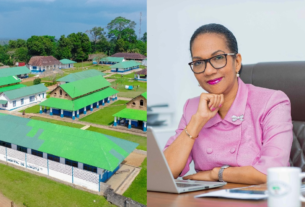At the 20th Indonesian Palm Oil Conference (IPOC 2024), Monique Gieskes, Managing Director of Plantations et Huileries du Congo (PHC), outlined PHC’s vision and commitments for the sustainable development of the palm oil industry in the Democratic Republic of Congo (DRC).
As the country’s largest palm oil producer, PHC aims to position the DRC as a new frontier for environmentally friendly palm oil production based on sustainable and responsible practices. The event was also attended by Mr Wale Adeosun, Chairman of Kuramo Capital Management, PHC’s main shareholder, and his partner and board member, Mr Shaka Kariuki.
Historical heritage and strategic advantages
Monique Gieskes recalled that the palm oil industry in the DRC dates back more than 100 years, when William Lever of the Lever Brothers Company came to the then Belgian Congo to produce palm oil to supply his soap factory in England. This company later became Unilever in 1929, following the merger between Lever Brothers Company and the United Margarine of the Netherlands. The PHC CEO also highlighted the DRC’s major contribution to technical and scientific advances in the palm oil industry, notably through the creation of the Tenera variety and the publication of the Mongana report, which remains a world reference in palm oil engineering.

The DRC offers several major advantages for the palm oil sector: abundant and suitable land. According to the Center for International Forestry Research (CIFOR), the Democratic Republic of Congo has 167 million hectares of land suitable for growing palm oil, 145 million hectares of which meet the sustainability criteria established by the Roundtable on Sustainable Palm Oil (RSPO);
Genetically advanced material: the world-renowned Yangambi variety has its origins in the DRC. In addition, other genotypes rich in vitamin E and devoid of carotenoids, with exceptional nutritional qualities, could still be developed to further enrich the industry;
A workforce with a positive social impact: In the face of high rural unemployment, oil palm plantations create essential jobs for local communities. PHC, through its ‘Partner Planters’ programme, supports communities by helping them to develop their own plantations, thereby strengthening the local economy and helping to reduce poverty.

Commitment to sustainable and responsible palm oil production
In line with the commitments made at COP-22 in Marrakech in 2016, the DRC and several African countries have joined the African Palm Oil Initiative. This joint commitment aims to promote a sustainable palm oil value chain. PHC supports this initiative, in line with its green growth strategy and zero deforestation policy.
‘PHC subscribes to this commitment and has chosen to follow a green growth strategy focused on yield intensification, best production practices based on precision agriculture, reduced dependence on fossil fuels, zero deforestation, biodiversity conservation and investment in the social and economic development of the communities around our operating sites’, emphasised Ms Giekes.
The sustainable palm oil production strategy is aligned with PHC’s vision of ‘creating shared prosperity through agribusiness’. Under the leadership of Managing Director Monique Gieskes, and with the support of majority shareholder Kuramo Capital Management, the company has embarked on a strategic transformation that promotes innovation and sustainable production. In three years, PHC has achieved annual production growth of 20%, thanks to modernised farming practices and optimised plantation productivity.

Commenting on Kuramo Capital Management’s investment in the DRC, its Chairman, Mr Wale Adeosun, said: ‘The Democratic Republic of Congo is a fast-growing market offering strategic opportunities, particularly in agribusiness. Kuramo Capital Management saw in PHC an exceptional potential to become a major player in the sustainable production of palm oil in the DRC. Under the leadership of Monique Gieskes, PHC is committed to a sustainable growth model that generates value for employees, local communities and investors. We are aiming for much more than a financial return: our ambition is to build an environmentally friendly leader in agribusiness.’
Shaka Kariuki, partner at Kuramo Capital Management and PHC board member, commented: ‘We recognise the importance of Indonesia’s experience in sustainable palm oil production. By participating in IPOC 2024, we seek to strengthen our investments in agribusiness through strategic partnerships. Our ambition is to promote a sustainable business model capable of attracting new investors and serving as an inspiration for similar initiatives in Africa and beyond’, said Mr Shaka Kariuki, Partner at Kuramo Capital Management and member of the PHC Board of Directors.
Speaking at the IPOC 2024 conference, Ms Gieskes encouraged participants to see the Democratic Republic of Congo as a land of exceptional opportunity for the palm oil industry and a destination of choice for investment, reaffirming the company’s commitment to working with new partners to realise this ambitious vision. ‘At PHC, we are ready to work with you to turn these opportunities into real achievements,’ she said.

PLANTATIONS ET HUILERIES DU CONGO (PHC) is a private limited company based in Kinshasa, in the Democratic Republic of Congo. A key player in the palm oil industry, it is the country’s leading producer of crude palm oil and crude palm kernel oil. Its operations include three large plantations and factories located in the Equateur, Mongala and Tshopo provinces. With more than 10,000 employees under contract, PHC is also the largest private employer in the DRC.
PHC’s vision, ‘Creating shared prosperity through agribusiness’, is ambitious and inclusive. Its mission is to become a global leader in sustainable agribusiness, with a positive social impact on the surrounding communities.
In addition to its sustainability efforts, PHC is actively engaged in social initiatives to improve the quality of life of its employees and local populations. The company manages the largest private hospital network in the country, providing healthcare to its employees and to around 150,000 people living around its sites. It also promotes access to drinking water and invests in education, rehabilitating schools and building new establishments for the benefit of the communities surrounding its operating sites.



